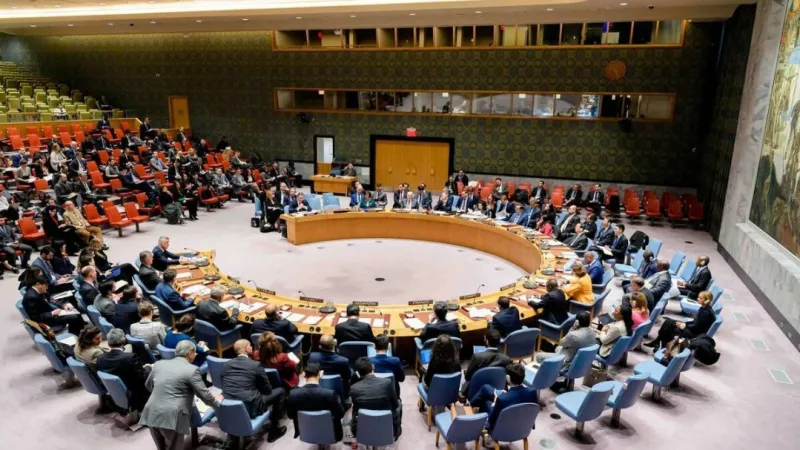The climate of insecurity and political instability in Haiti was at the center of a meeting held Thursday, April 16, at the United Nations Security Council.
In a report presented to the assembly, UN Secretary General Antonio Guterres reviewed the situation in Haiti, characterized by insecurity, human rights violations, dysfunctional institutions, and political instability, among others. The report notes the continued escalation of gang violence, including kidnappings and violent murders in the Port-au-Prince area. This, the report points out, is causing a deep sense of concern among the population.
”Not all kidnappings and intentional killings are reported, but the Haitian National Police still recorded 540 kidnappings between January 1 and May 31, 2022 (an increase of 36.4 percent), compared to 396 in the last five months of 2021, while the number of intentional killings increased by 17 percent, from 668 in the last five months of 2021 to 782 in the first five months of 2022.” says the report.
The report highlights a sharp increase in kidnapping cases for the month of May with a total of more than ”198 kidnappings and 201 homicides reported, mostly in the West department.
Clashes between armed gangs in the Port-au-Prince metropolitan area intensified and spread to adjacent neighborhoods in late April and early May, with violent fighting breaking out between rival gangs in Croix-des-Bouquets and La Plaine de Cul-de-Sac and Cité Soleil. More than 17,000 civilians have fled these gang-ridden areas, becoming displaced persons and leading to the formation of new camps near areas that are difficult for emergency services to access.
Residents of the Martissant neighborhood of Port-au-Prince and the communes of Croix-des-Bouquets, Tabarre, and Delmas, where crime and violence remain the most blatant, continue to demand that the government take a firm stand against armed gangs.
In addition to the civilian population, the national police is also one of the victims of this situation of insecurity that is taking hold in the country. According to the report submitted to the security council, the number of national police officers has decreased significantly due to resignations, retirements and deaths.
In fact, “out of a total of 15,459 registered members (PNH staff, editor’s note), only some 12,800 were active as of May 31. This discrepancy is explained by a significant number of desertions, absences for health reasons and suspensions, as well as by the systematic use of police officers for close protection,” writes the UN.
This downward trend is expected to continue due to a lack of sustained recruitment and training efforts. This failure diminishes the operational capacity of the police institution in a context of increasing acts of violence.
As a result, the enjoyment of human rights remains a pipe dream. Organized gangs continue to commit murders, kidnappings, and sexual violence with impunity, controlling almost every neighborhood in the capital.
The report of the UN Secretary General underlines that “kidnappings remain a reality in the daily life of Haitians and a source of income for organized gangs”. No segment of society is immune to this scourge, the UN notes, arguing that “doctors, lawyers, health personnel, teachers and human rights defenders are among the most affected (men or women), while kidnapped women and girls are at high risk of sexual and gender-based violence during their captivity.
The report notes that organized protests against abductions have resulted in demonstrations and strikes, particularly in hospitals.
To protest the abductions, health care workers, students, and public transportation drivers demonstrated throughout the capital from March 14 to 16. Private hospitals and clinics joined the movement by organizing a work stoppage.
Other points in the Secretary General’s report presented to the Security Council include food insecurity resulting from the blockade imposed by gangs in the Martissant neighborhood. The report states that “in addition to the violence, the organized gangs have continued to infiltrate the local economy through extortion, racketeering and the illegal levying of taxes”. The report notes “the deterioration of security in the Martissant section of National Road 2, where organized gangs require ferry owners to pay them $100 per vehicle transported. Not only does the current situation limit freedom of movement, but it also has a direct impact on food security and access to goods in the capital and the southern regions of the country.
From the perspective of the functioning of institutions and the delivery of justice, the report notes that “the Haitian judicial system remains plagued by corruption, insufficient resources, and lack of political will, which contribute to the blockage of proceedings. Investigations into the La Saline (2018) and Bel-Air (2019) massacres and the assassination of Monferrier Dorval (batônier 2020), president of the Port-au-Prince Bar Association, have not progressed. In addition, the poor functioning of the justice system accentuates the phenomenon of prolonged pre-trial detention. More than 85% of young minors incarcerated in Haitian prisons remain in pre-trial detention for exceptionally long periods,” reads the 31-page report.







